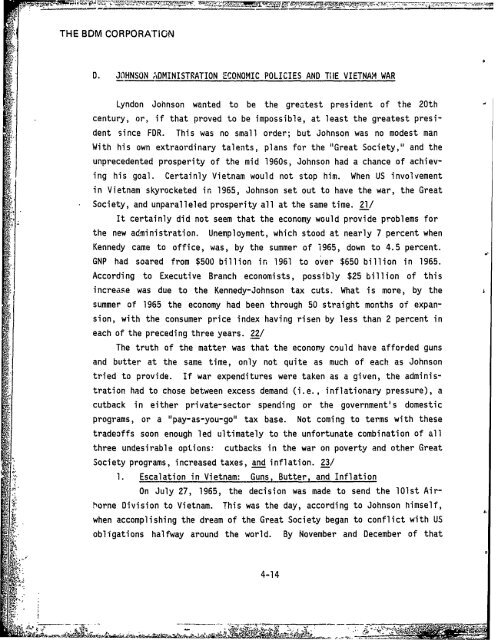policy - The Black Vault
policy - The Black Vault
policy - The Black Vault
Create successful ePaper yourself
Turn your PDF publications into a flip-book with our unique Google optimized e-Paper software.
THE BDM CORPORATION<br />
D. JOHNSON ADMINISTRATION ECONOMIC POLICIES AND THE VIETNAM WAR<br />
Lyndon Johnson wanted to be the greatest president of the 20th<br />
century, or, if that proved to be impossible, at least the greatest president<br />
since FDR. This was no small order; but Johnson was no modest man<br />
With his own extraordinary talents, plans for the "Great Society," and the<br />
unprecedented prosperity of the mid 1960s,<br />
Johnson had a chance of achieving<br />
his goal. Certainly Vietnam would not stop him. When US involvement<br />
in Vietnam skyrocketed in 1965,<br />
Johnson set out to have the war, the Great<br />
Society, and unparalleled prosperity all at the same time. 21/<br />
It certainly did not seem that the economy would provide problems for<br />
the new administration. Unemployment, which stood at nearly 7 percent when<br />
Kennedy came to office, was, by the summer of 1965, down to 4.5 percent.<br />
GNP had soared from $500 billion in 1961 to over $650 billion in 1965.<br />
According to Executive Branch economists, possibly $25 billion of this<br />
increase was due to the Kennedy-Johnson tax cuts. What is more, by the<br />
summer of 1965 the economy had been through 50 straight months of expansion,<br />
with the consumer price index having risen by less than 2 percent in<br />
each of the preceding three years. 22/<br />
<strong>The</strong> truth of the matter was that the economy could have afforded guns<br />
and butter at the same time, only not quite as much of each as Johnson<br />
tried to provide.<br />
If war expenditures were taken as a given, the administration<br />
had to chose between excess demand (i.e., inflationary pressure), a<br />
cutback<br />
in either private-sector spending or the government's domestic<br />
programs, or a "pay-as-you-go" tax base. Not coming to terms with these<br />
trade3ffs soon enough led ultimately to the unfortunate combination of all<br />
three undesirable options:<br />
cutbacks in the war on poverty and other Great<br />
Society programs, increased taxes, and inflation. 23/<br />
1. Escalation in Vietnam: Guns, Butter, and Inflation<br />
On July 27, 1965, the decision was made to send the 101st Airhorne<br />
Division to Vietnam. This was the day, according to Johnson himself,<br />
when accomplishing the dream of the Great Society began to conflict with US<br />
obligations halfway around the world. By November and December of that<br />
4-14<br />
'.'. _7
















